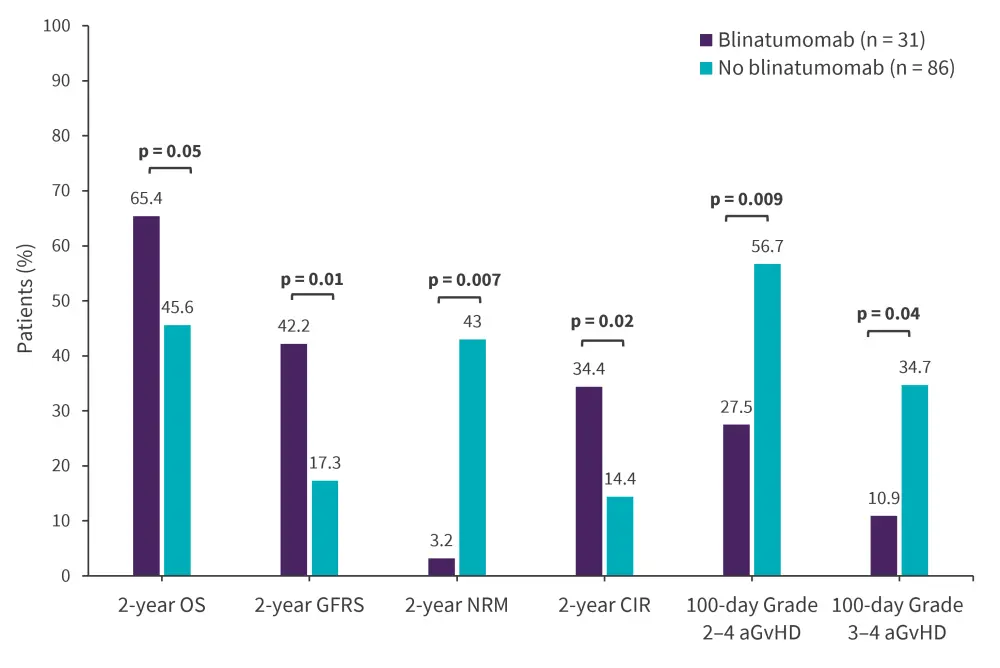All content on this site is intended for healthcare professionals only. By acknowledging this message and accessing the information on this website you are confirming that you are a Healthcare Professional. If you are a patient or carer, please visit Know ALL.
The all Hub website uses a third-party service provided by Google that dynamically translates web content. Translations are machine generated, so may not be an exact or complete translation, and the all Hub cannot guarantee the accuracy of translated content. The all and its employees will not be liable for any direct, indirect, or consequential damages (even if foreseeable) resulting from use of the Google Translate feature. For further support with Google Translate, visit Google Translate Help.
The ALL Hub is an independent medical education platform, sponsored by Amgen, Autolus, Jazz Pharmaceuticals, and Pfizer and supported through an educational grant from the Hippocrate Conference Institute, an association of the Servier Group. Funders are allowed no direct influence on our content. The levels of sponsorship listed are reflective of the amount of funding given. View funders.
Now you can support HCPs in making informed decisions for their patients
Your contribution helps us continuously deliver expertly curated content to HCPs worldwide. You will also have the opportunity to make a content suggestion for consideration and receive updates on the impact contributions are making to our content.
Find out more
Create an account and access these new features:
Bookmark content to read later
Select your specific areas of interest
View ALL content recommended for you
The effect of blinatumomab prior to allo-HSCT in adult patients with B-ALL
Adult patients with acute lymphoblastic leukemia (ALL) have a poor prognosis, and 5-year overall survival (OS) in adults aged >50 years is 20%. Blinatumomab has shown efficacy in patients with relapsed/refractory B-cell ALL (B-ALL) and has achieved minimal residual negativity; however, there are limited data on the impact of pretransplant blinatumomab in adults.
Here, we summarize a retrospective study on the effect of blinatumomab prior to allogeneic stem cell transplantation (allo-HSCT) in adult patients with B-ALL, published by Sayyed et al.1 in Transplantation and Cellular Therapy.
Study design1
- This retrospective study included adult patients with B-ALL who underwent allo-HSCT at the Princess Margaret Hospital, Toronto, CA, between January 2010 and December 2021.
- The study endpoints included OS, cumulative incidence of relapse, non-relapse mortality (NRM), and graft-versus-host disease and relapse-free survival (GRFS).
Key findings1
Patient baseline characteristics
- A total of 117 patients were included in the analysis, of which 31 patients received blinatumomab before allo-HSCT
- Key baseline characteristics differed between the two cohorts, as summarized in Table 1
Table 1. Patient baseline characteristics*
|
Characteristic, % |
Overall |
Blinatumomab |
No blinatumomab |
p value |
|
GvHD, graft-versus-host disease; MRD, minimal residual disease; Ph, Philadelphia chromosome; PTCy, post-transplant cyclophosphamide *Adapted from Sayyed, et al.1 |
||||
|
Diagnosis |
|
|
|
p = 0.01 |
|
Ph-negative |
57.3 |
77.4 |
50 |
|
|
Ph-positive |
42.7 |
22.6 |
50 |
|
|
Disease-risk index |
|
|
|
p < 0.001 |
|
Intermediate |
68.4 |
35.5 |
80.2 |
|
|
High |
30.8 |
61.3 |
19.8 |
|
|
Very high |
0.8 |
3.2 |
0 |
|
|
Indication for transplant |
|
|
|
p < 0.001 |
|
Relapse |
29.9 |
54.8 |
20.9 |
|
|
Primary induction failure |
16.2 |
41.9 |
7.0 |
|
|
Chemotherapy intolerance |
2.7 |
0 |
3.5 |
|
|
High-risk features |
39.3 |
0 |
53.5 |
|
|
Therapy-related |
8.5 |
3.2 |
10.5 |
|
|
MRD positivity after chemotherapy |
3.4 |
0 |
4.7 |
|
|
Dual T-cell depletion |
|
|
|
p = 0.005 |
|
Yes |
39.3 |
61.3 |
31.4 |
|
|
No |
60.7 |
38.7 |
68.6 |
|
|
PTCy-based GVHD prophylaxis |
|
|
|
p < 0.001 |
|
Yes |
45.3 |
80.6 |
32.6 |
|
|
No |
54.7 |
19.4 |
67.4 |
|
|
Lines of treatment before transplant |
|
|
|
p < 0.001 |
|
1 |
49.6 |
0 |
67.4 |
|
|
2 |
41.0 |
64.5 |
32.6 |
|
|
3 |
7.7 |
29.0 |
0 |
|
|
4 |
1.7 |
6.5 |
0 |
|
|
Year of transplant |
|
|
|
p < 0.001 |
|
2010–2015 |
72 |
57 |
95 |
|
|
2016–2021 |
15 |
22 |
5 |
|
Survival and relapse outcomes
- After a median follow-up of 36 months,
- 2-year OS, GRFS, and the cumulative incidence of relapse was significantly higher in patients who received blinatumomab vs those who did not (Figure 1); and
- the 2-year NRM and Grade 2–4/Grade 3−4 acute graft-versus-host disease at Day 100 was significantly lower in patients who received blinatumomab prior to allo-HSCT versus those who did not (Figure 1).
- The incidence of Grade 2−4 and Grade 3−4 acute graft-versus-host disease in the total cohort was 48.9% and 27.8%, respectively.
- Multivariate analysis revealed a significant association between pretransplant blinatumomab and improved OS and NRM.
Figure 1. 2-year outcomes in blinatumomab treated vs no blinatumomab groups*

aGvHD, acute graft-versus-host disease; CIR, cumulative incidence of relapse; GRFS, GvHD-free and relapse-free survival; NRM, non-relapse mortality; OS, overall survival
*Data from Sayyed, et al.1
| Key learnings |
|
References
Please indicate your level of agreement with the following statements:
The content was clear and easy to understand
The content addressed the learning objectives
The content was relevant to my practice
I will change my clinical practice as a result of this content


